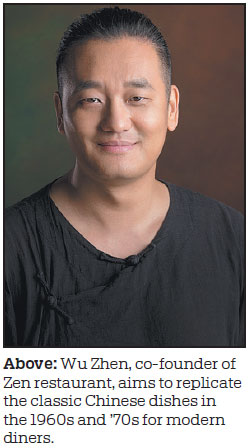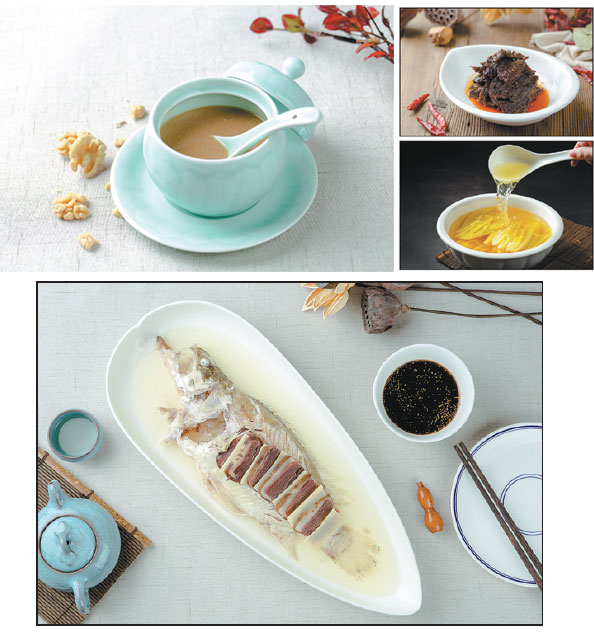Stirring up the past
Using a recipe book published by Beijing hoteliers during the 1970s as a reference point, a couple took the Zen approach to Chinese cuisine and set up their own eatery to pay homage to the long-forgotten flavors featured in it, Li Yingxue reports.
Wei Yuanjun remembers when she was a kid, she liked to read recipes. Her favorite was a recipe book written by chefs at the Beijing Hotel and published in 1979 - her copy of the book is now dog-eared as they seemed so delicious that she read the recipes over and over again.
Luckily for Wei, she's had the chance to taste many of these mouthwatering dishes, because her father Wei Jinting was a top chef at the Beijing Hotel.
|
Clockwise from top left: Walnut cream, beef with orange peel, steamed Chinese cabbage in supreme soup and steamed mandarin fish are among the signature dishes of Zen restaurant in Beijing. Photos Provided to China Daily |
These days Wei Yuanjun likes to collect old recipes. She now owns three editions of the recipe book published over the years. But as time goes on, she finds that it's not as easy as it once was for her to remember the flavors of the dishes from her childhood memory.
It's also rare to find many of the dishes on restaurant menus in China nowadays.
"One of the reasons these classic dishes are vanishing is that they take a long time to prepare and require complex cooking skills to create them," she says.
Three years ago, Wei and her husband Wu Zhen opened a restaurant, Zen, in the historical Qianmen area of Beijing - with the original goal of replicating all the dishes in the book.
"I felt it would be a pity if we lost all these classic dishes, because each of them has been perfected by several generations of Chinese chefs," says Wei.
The book lists the quantities and cooking methods to make around 1,000 dishes - 284 dishes from Sichuan cuisine, 151 Cantonese dishes, 235 dishes from Huaiyang cuisine and 121 Tan imperial cuisine dishes, together with 70 cold dishes and 150 pastries. Some of the dishes were prepared for state banquets at the Beijing Hotel.
Founded in 1900, the Beijing Hotel used to host state banquets featuring Sichuan, Huaiyang and Cantonese cuisine, which represented the highest standard of cooking during the 1960s and '70s.
Before opening their restaurant in 2016, the couple spent months practicing how to make around 30 dishes under the instruction of her father Wei Jinting, 82, a Sichuan cuisine chef at Beijing Hotel, who learned his craft from master chef Luo Guorong. Then, each dish was made dozens of times ahead of the opening, before Wei gave them his final seal of approval.
"There are other young chefs who would like to replicate the classic dishes from the 1960s and '70s, but they don't know if they can cook them properly," says Wu.

"We were lucky because when we wanted to learn about a classic dish, we would ask my father-in-law and discuss how to make the dish with him. The recipes in the book are a bit general, so we needed his knowledge to replicate them properly."
Most of the dishes at Zen are from Sichuan cuisine, including its signature dish - kung pao chicken. The couple's take on this classic sweet-and-sour dish is both spicy and viscous, but the chilis are more of a red-brown hue rather than the usual flaming red color.
"The chilis in the original kung pao chicken at the Beijing Hotel were cooked to almost a black color, which can be verified by a color photo that appears in one version of the recipe book," says Wei Yuanjun. "But they are edible and the aroma of the chili is more prominent in this dish."
The couple aim to help diners understand that spiciness is not the only aspect to Sichuan cuisine, which has more than 20 flavors, including sweet-and-sour, garlic and sesame.
Steamed Chinese cabbage in supreme soup is just one example of this at Zen. The dish was created by a grandmaster of Sichuan cuisine, Huang Jinglin, during the Qing Dynasty (1644-1911) and Luo Guorong was tasked with making the dish shine at state banquets in the 1950s.
The soup is boiled with chicken, duck and pork ribs for several hours before a meatball made of mashed chicken and pork is placed in the bowl to absorb the oil and fat to leave a clear, tasty soup.
"When we first served this dish, our clients - who were used to the heavy flavors of Sichuan cuisine - thought the price was too high for a bowl of light soup," says Wu. "But now people have gained an appreciation for the soup and respect the hours of preparation that have gone into it."
The couple's restaurant attracts some diners in their 80s who can tell if the flavors of the dishes match the ones they tasted decades ago. Sometimes they offer the couple information or ideas about forgotten classic dishes from the past.
Renowned Hong Kong food critic Chua Lam visited Zen three years ago, where he ordered a dish of steamed pork liver. Wu had not heard of the dish before and asked Wei Jinting for help.
Wei Jinting recalled that the dish had indeed been made for a state banquet decades ago, and offered to teach Wu how to make it - which took the duo dozens of trial runs to perfect.
"It's like making a steamed egg custard where the surface of the dish has to be soft and flat and without any bubbles. Choosing the right kind of liver is another key aspect to figure out," says Wu.
Wu relishes the chance to cook for his older diners and enjoys discussing old dishes with them.
The menu at Zen now lists around 100 dishes, which Wu thinks is enough for one restaurant. If he ends up working out dozens of other dishes he would have to open a new restaurant.
"Now I realize that to replicate all 1,000 dishes is almost impossible, as the more we explore, the harder it is to find information about them. They're vanishing quickly," Wu says. "But I'll continue doing this and try to recreate as many classic dishes as I can."
Wei Yuanjun thinks that Chinese recipe books are undervalued as it's not a favorite genre among collectors. Wei and her husband are planning to write their own book about classic Chinese dishes to save them for posterity.
"We would like to share our recipes with other chefs so these classic dishes can be picked up by future generations," says Wei.
Contact the writer at liyingxue@chinadaily.com.cn
(China Daily Global 06/21/2019 page16)



















